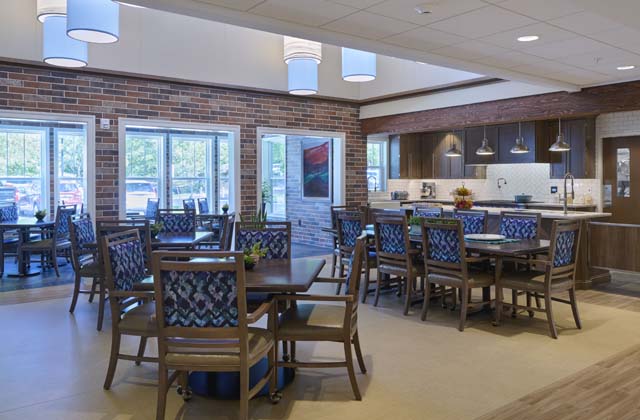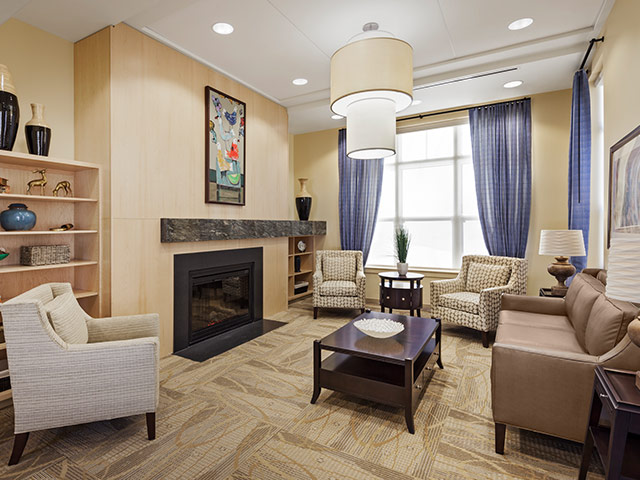All Concerning Memory Treatment Services: Why Small Memory Treatment Residences Are a Wonderful Selection
Memory treatment services play a vital role in supporting individuals with Alzheimer's and mental deterioration. Tiny memory care homes stand out for their personalized approach and intimate setup. With reduced staff-to-resident proportions, these homes foster stronger links and customized treatment. Residents gain from improved social communications and a secure setting. As households check out alternatives, understanding the unique advantages of little memory treatment homes becomes essential. What variables should be thought about when choosing the ideal home?
Comprehending Memory Treatment Solutions
While many may be familiar with basic senior care alternatives, comprehending memory treatment solutions is vital for families dealing with the challenges of cognitive decline. Memory treatment particularly accommodates individuals with problems such as Alzheimer's disease and various other forms of dementia. These solutions offer an organized environment that concentrates on boosting the lifestyle for residents with specialized treatment and support.Memory care centers are made to guarantee security and safety and security, usually featuring protected settings to stop straying. Educated employee are readily available all the time to aid with everyday tasks, medicine monitoring, and individual care. Furthermore, memory care programs commonly include cognitive excitement activities, tailored to involve residents and promote mental well-being. Families can take advantage of recognizing these solutions, as they enable informed decisions regarding their loved ones' care, making sure that their details demands and preferences are addressed in a helpful and caring way.
The Benefits of Little Memory Treatment Homes
Small memory treatment homes offer unique advantages that can significantly enhance the high quality of life for citizens with cognitive problems. One substantial advantage is the intimate environment, which allows for individualized communications amongst team and homeowners. This smaller setting cultivates significant partnerships, lowering feelings of seclusion and anxiousness usually experienced by individuals with memory issues.Additionally, the lower staff-to-resident ratio in little memory treatment homes allows caretakers to provide even more alert guidance and assistance. This strategy not only enhances safety and security yet additionally promotes a feeling of security for the residents.Moreover, small memory treatment homes can adapt rapidly to the distinct needs and choices of each local, permitting a much more homelike ambience. Such an environment can motivate social engagement and engagement in activities, ultimately enhancing the daily experiences of those dealing with cognitive problems.
Personalized Care Program for Citizens
Individualized care strategies are crucial in memory care homes, as they deal with the special needs and choices of each local. These strategies start with complete assessments performed by knowledgeable professionals, that evaluate cognitive capabilities, medical history, and individual passions. This tailored technique warranties that care is not only efficient however likewise respectful of each person's self-respect and autonomy.Moreover, customized treatment plans are versatile, permitting adjustments as citizens' demands develop with time. This adaptability promotes a complacency and experience, which is necessary for individuals coping with memory challenges. Caretakers are trained to implement these strategies constantly, giving assistance that straightens with the residents' regimens and preferences.Ultimately, individualized care strategies improve the lifestyle for homeowners by advertising health, interaction, and freedom, making them an essential aspect of memory treatment solutions in small memory treatment homes.
Producing a Home-Like Setting
Producing a home-like atmosphere is essential for cultivating comfort and familiarity in memory treatment settings, as it considerably impacts locals' psychological wellness. Small memory treatment homes frequently focus on tailored touches, such as warm shade combinations, family pictures, and acquainted furniture setups, which help homeowners feel a lot more comfortable. Including aspects evocative a conventional home, like comfy living areas and public areas, motivates a feeling of belonging.Moreover, using all-natural light and outside spaces can improve the ambience, promoting relaxation and peace. Team member play a substantial duty in maintaining this atmosphere by engaging with homeowners in a thoughtful manner, treating them like household. Regular activities, such as food preparation or gardening, can likewise add to a home-like feel, using chances for residents to take part in significant experiences. On the whole, developing a supporting setting supports cognitive feature and psychological security, making it a crucial facet of memory care services.
Enhanced Social Interaction and Neighborhood
Improved social interaction and neighborhood are crucial parts of memory treatment solutions. By cultivating individualized social engagement and creating a family-like ambience, these services promote purposeful links among residents. Group activities and events additionally motivate participation, assisting people feel more included and sustained.
Individualized Social Engagement
While social interaction is important for general wellness, lots of individuals with memory disabilities typically struggle to engage meaningfully with others. Personalized social involvement in memory care homes addresses this obstacle by developing tailored activities that deal with homeowners' unique interests and abilities. By concentrating on specific choices, caregivers can promote links that resonate deeply with everyone. Tasks such as art therapy, music sessions, and assisted discussions advertise cognitive stimulation and emotional expression. Furthermore, small team settings urge camaraderie and permit more intimate communications, improving feelings of belonging. This strategy not only combats sensations of seclusion however additionally equips residents to keep a feeling of identification, ultimately adding to enhanced psychological wellness and high quality of life.
Family-like Atmosphere
In a memory treatment setting, fostering a family-like atmosphere significantly boosts social interaction and constructs a sense of neighborhood amongst locals. Smaller memory treatment homes typically prioritize intimate settings, enabling locals to create closer connections with each other and employee. This nurturing ambience advertises trust, which is necessary for people with memory impairments. Citizens are most likely to talk and share experiences, developing a supportive network that relieves feelings of loneliness. The knowledge of common areas and regimens contributes to a feeling of belonging, better motivating social communication (personalized memory care). In such setups, psychological bonds prosper, leading to improved general wellness and a higher top quality of life for residents as they navigate their daily experiences together
Group Activities and Events

Security and Safety Features in Small Homes
Several tiny homes developed for memory care include crucial safety and security and safety features to ensure the well-being of residents. These homes often utilize safe and secure entrance and exit indicate avoid wandering, a common worry among people with memory problems. In addition, monitoring systems and alarm devices improve monitoring, guaranteeing that personnel can promptly reply to any type of unusual activities.Interior designs are customized for safety, with decreased dangers such as sharp corners and clutter-free pathways. Handrails and non-slip floor covering are generally mounted to reduce the danger of drops. Team members are educated in emergency protocols, ensuring they are prepared for numerous situations.Moreover, personalized treatment plans might consist of evaluation of specific security demands, offering customized solutions for every homeowner. Overall, these security and protection features create a caring environment where citizens can flourish while keeping their dignity and self-reliance.
How to Choose the Right Memory Care Home
Exactly how can family members assure they pick the most suitable memory care home for their liked ones? The choice calls for mindful factor to consider of several elements. Households must examine the center's team credentials and training, making certain that caretakers are experienced in managing memory-related conditions. Next off, it's essential to analyze the home's setting, concentrating on safety and security functions and whether it promotes a sense of community and belonging. Visiting the facility can supply understanding right into day-to-day tasks and the social atmosphere, which are necessary for psychological stimulation and psychological health. In addition, households must ask about the treatment plans provided, guaranteeing they are customized to private requirements. Finally, considering the home's area and accessibility for household visits can contribute to a smoother shift. By dealing with these aspects, households can make an enlightened choice that prioritizes their enjoyed one's convenience and quality of life in a you could check here memory care setup.
Regularly Asked Inquiries
What Credentials Should Personnel Members in Memory Care Homes Have?
Staff participants in memory care homes need to possess pertinent accreditations, experience in dementia treatment, strong communication skills, and compassion. Ongoing training in behavior administration and restorative treatments enhances their capability to support homeowners successfully.
Exactly How Do Memory Care Solutions Differ From Conventional Assisted Living?
Memory care solutions focus especially on individuals with memory impairments, giving specific assistance and organized environments. On the other hand, standard assisted living offers general aid with everyday tasks, lacking the customized method needed for those with cognitive challenges.
What Sorts of Activities Are Used in Memory Treatment Residences?
Memory care homes commonly offer a range of tasks made to involve residents. Common choices consist of art treatment, songs sessions, cognitive video games, exercises, horticulture, and get-togethers, all focused on improving wellness and cognitive function.
Can Citizens Bring Their Own Valuables to Memory Treatment Houses?
Locals can typically bring their own possessions to memory treatment homes, permitting them to individualize their home - personalized memory care. This method aids produce an acquainted setting, promoting comfort and a sense of identification for the people

Just How Are Relative Involved in the Care Refine?
Member of the family play a crucial function in the treatment procedure, typically joining decision-making, participating in treatment meetings, and offering psychological assistance. Their involvement fosters a joint setting, improving the citizen's general wellness and high quality of life. While numerous may be familiar with general elderly treatment alternatives, recognizing memory care services is important for households facing the difficulties of cognitive decrease. These solutions supply an organized environment that focuses on improving the high quality of life for residents through specialized treatment and support.Memory care facilities are made to ensure safety and safety, typically including safeguarded atmospheres to prevent roaming. Personalized treatment strategies are crucial in memory treatment homes, as they cater to the special requirements and preferences of each local. Staff participants in memory care homes ought to have pertinent qualifications, experience in dementia care, solid interaction abilities, and empathy. Memory treatment solutions concentrate particularly on people with memory impairments, giving specialized support and organized environments.